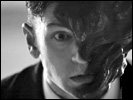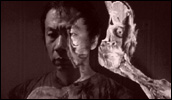Tetsuo: The Bullet Man
- Year
- 2010
- Original title
- Tetsuo the Bullet Man
- Japanese title
- 鉄男 THE BULLET MAN
- Director
- Cast
- Running time
- 79 minutes
- Published
- 20 January 2011



by Tom Mes
Seventeen years in gestation, two years in various forms of production and post-production, a false start in competition at the Venice film festival, and the last-minute entry of a world-renowned rock star that boost its international appeal: Shinya Tsukamoto's third installment in his signature Tetsuo series has traveled a long and winding road before finally reaching our screens.
Although Tetsuo: The Bullet Man is no longer the "Tetsuo in America" of its origins, the US of A still looms large over the final product: the majority of the film's dialogue is spoken in English; the film's protagonist Anthony is half-American, half-Japanese and played by Tokyo-based American actor Eric Bossick; the script was written in a Hollywood-style three-act, expositionary structure; and with an American running rampant while transforming into a human weapon of mass destruction, the references to the US's role in global politics are evident.
As the director explains in the interview elsewhere on this site, these were conscious choices. From the start, the idea of a third Tetsuo went hand-in-hand with either American funding or location shooting and over the years Tsukamoto never shook off the connection. As Steven Brown notes in his recent book Tokyo Cyberpunk, Tsukamoto's filmmaking and particularly the original Tetsuo is profoundly transnational. Blade Runner, Alien, The Fly, and Godzilla were all influences of equal importance on the 1989 epoch-making indie.
So with Tetsuo: The Bullet Man Tsukamoto at last gets his chance to overtly pay tribute to his influences by making an English-language, Japanese-funded film shot in Tokyo featuring a very international cast doing their own riffs on one of the icons of contemporary Japanese cinema. Bossick's twitchy physicality is equal parts method and butoh, while French film critic Stephen Sarrazin relishes the opportunity to employ an American accent and pepper the film with Clint Eastwood references in his role as a self-loathing savant fou.
Tsukamoto himself returns as The Guy, the one-time metal fetishist turned depressed and suicidal lone terrorist, who hopes to get a final dose of kicks from pushing Anthony over the edge by driving a car over his little son. Tsukamoto's performance and appearance here are more reminiscent of his turn as the villain Zero in Nightmare Detective than of The Guy's previous incarnation as the youthful and charismatic cult leader in Tetsuo II.
All these details and touches make Tetsuo: The Bullet Man a film that is (somewhat inevitably) always referring to the past, as well as to other works of cinema. Nightmare Detective (2006) was already a very self-reflective film on Tsukamoto's part, coinciding with equally self-referential works from two other heavyweights from the same generation: Takashi Miike with Like A Dragon (Ryu ga Gotoku, 2007) and Kiyoshi Kurosawa with Retribution (Sakebi, 2006). When filmmakers start filling their work with nods to their earlier films, they have either run out of ideas or are going through a transitional phase. With Miike having gone on to direct the likes of 13 Assassins and Zebraman 2, and Kurosawa delivering the astonishing Tokyo Sonata, the latter has been the case so far. But what about Tsukamoto?
Interestingly enough in this context, the largely negative reviews and reactions Tetsuo: The Bullet Man garnered after its initial unveiling at the 2009 Venice film festival were rather reminiscent (for those who remember) of the less than cordial welcome originally reserved for Tetsuo II: The Body Hammer. After all, back in 1992/93, many of those who had championed the original Tetsuo: The Iron Man three years earlier decried the switch to colour, the elevated budget and the perceived conventional style. Very similar arguments have been heard in response to Tetsuo: The Bullet Man - though regarding Tetsuo II the objections seem to have largely been forgotten.
But, in retrospect, could Tetsuo: The Bullet Man ever have hoped to garner praise? It not only has the considerable legacy of the first two films to fight against, but also the spectre of the Tsukamoto / Tarantino / Tim Roth / Roger Avary version that never was. Seen from this angle, the film was and always will be up against a fantasy in fans' heads that is sweeter, cooler, and better than any actual hands-on film could ever be. Filling Tetsuo's boots is one thing, filling imaginary boots is quite another.
So what of the criticism? A fair share of the blows were dealt to the fact that Tetsuo: The Bullet Man is largely spoken in English. However, surely the language and its delivery could hardly be an issue with the latest entry in a series that has never been characterised by naturalistic acting styles. Or are we now at last noticing shortcomings of which we were never aware because their being committed by Japanese people in their own language made us either incapable of judging them or made us qualify them, consciously or otherwise, as pleasingly exotic?
No, the language and delivery of Tetsuo: The Bullet Man never were shortcomings in the first place, but stylistic choices. Surely after a decade of Takashi Miike films populated with Japanese actors speaking Chinese, Filipino actors speaking Japanese, Russians playing Americans, and Heike-warriors reciting Shakespeare, the world audience for Japanese genre cinema (predominantly non-native English speakers, mind you) has come to develop a certain flexibility in tolerating acting styles and dialogue delivery? And even if naturalism is what one craves from an actor, surely the not entirely uncommon occurrence of Japanese actors speaking their English dialogue with a Japanese accent, like Akiko Monou and Yuko Nakamura do in Tetsuo: The Bullet Man, should be met with a certain degree of understanding.
Tsukamoto's use of the digital camera - a technical mark-up comparable to the switch to colour on Tetsuo II - picks up where he left off with Haze and will likely constitute the future for the eternal independent Tsukamoto. Certainly now that Tetsuo: The Bullet Man has hardly proven a commercial success in its home territory, Tsukamoto and his Kaijyu Theatre production outfit will likely remain on the margins of the filmmaking industry for good. Should this prove to be the case, Tsukamoto's embracing of the digital format will at least alleviate this predicament somewhat, giving the director more flexibility to shoot where, as, and when he pleases. It is not entirely unlikely that a further evolution in his style will be the result. And if anyone's creative evolution in Japanese film has been a consistently fascinating process to observe, it is Tsukamoto's.
The weaknesses apparent here are of another nature. The director's intentional switch to a more reasoned, expositional form of narrative sits rather uncomfortably with the purely erratic process of the Iron Man's transformation, as well as with the above mentioned stylized performances. With the inclusion of a family background for the protagonist - a wife and child as per part II but also a father and mother - plus, even more importantly, the psychology that goes with it (Oedipal issues, marital tension, etc.), pathos rears its head. For the first time in a Tetsuo film, we are meant to have an affective reaction to the protagonist's plight. Admittedly, this is somewhat of a challenge when said protagonist has a metallic head the size of beach ball and drools motor oil from its no less deformed mouth. And so, a crucial factor in the way the film wants to appeal to its audience is lost.
The other problem, though less immediately apparent, is the absence of eroticism. The first Tetsuo was deeply fetishistic, and it overtly and irreverently explored various forms of sexual deviance, natural and otherwise. This approach was abandoned in Tetsuo II through the choice of making the protagonist a husband and father, but was replaced by a strong current of homoeroticism. Tetsuo: The Bullet Man, however, seems to preach chastity. A few verbal gripes by The Guy aside, sexuality is wholly absent. The first physical sign of affection between husband and wife occurs just before the end credits. Even the aforementioned Oedipal issues are explored through the tensions between father and son only, leaving the dramatic and erotic potential of the presence of the perfectly preserved young body of the departed mother unused. That she is played by Yuko Nakamura, who demonstrated a good deal of erotic charisma in her roles as a stripper in Naomi Kawase's Hotaru and as a kinky call girl in Hitoshi Yazaki's Strawberry Shortcakes, makes one lament this missed opportunity all the more.
Perhaps it is the casting of Eric Bossick or, more precisely and fundamentally, the choice to have a foreign protagonist, that dissuaded (discouraged?) the director from engaging sexuality in his film. Did the man who infused eroticism into metallic mutants, breast amputation, and a dissected corpse, to name but a few examples, find himself suddenly tongue-tied and blushing at having to deal with the (naked) foreign body? For all the psychology broached in the film, perhaps this is Tetsuo: The Bullet Man's most revealing insight.
Tetsuo: The Bullet Man IS a true Tetsuo film as well as a true Tsukamoto film. There is no doubt about this; it represents another step in the evolution of both. It plays as much - perhaps more - with themes and motifs from Vital, Haze, and Nightmare Detective as with those from the first two Tetsuos. Technically - and by extension, stylistically - it shows that Tsukamoto is heading in a new direction that could yield promising results. It is also a farewell of sorts, to the cyberpunk Tsukamoto that once was. If the Tsukamoto who emerges from this experience, liberated from that nagging little iron man that's been crawling through his system for the past 24 years (since 1986's The Phantom of Regular Size), is the unchained, unadulterated version of the filmmaker we began to glimpse with A Snake of June and Vital, then "promising" will be a royal understatement for what awaits.